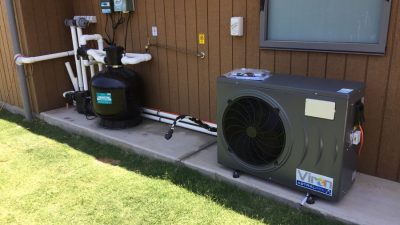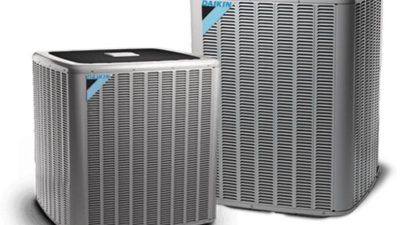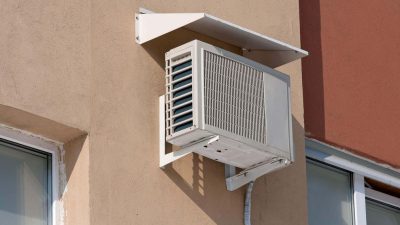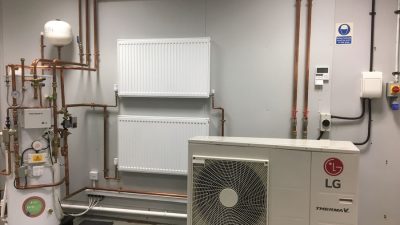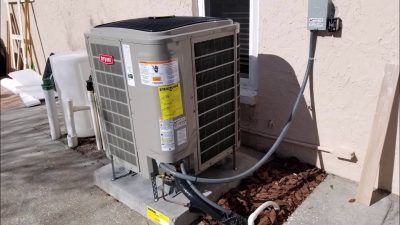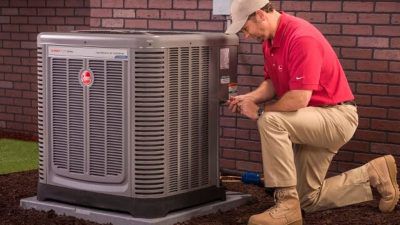Are you looking to make your home more energy efficient and help reduce your carbon footprint? Heat pumps are an increasingly popular option for homeowners who want to save money on heating costs, while also helping the environment. But just how efficient are they, really? In this article, we’ll take a look at the technology behind heat pumps, as well as their benefits and drawbacks.
Heat pumps work by transferring heat from one area to another using a refrigerant system. They can be used for both cooling and heating, making them a great all-around solution for temperature regulation in any home. Heat pumps use less energy than traditional heating systems, making them more cost-effective in the long run. Plus, they’re much quieter than other types of heating systems!
Heat pumps can provide substantial savings on energy costs over time, but it’s important to consider their drawbacks as well. For one thing, heat pumps require regular maintenance in order to keep running smoothly and efficiently. Additionally, they may not be suitable for very cold climates due to their lower efficiency when temperatures fall too low.
Now that you have a better understanding of how heat pumps work and their advantages and disadvantages, let’s dive deeper into this topic to get a clearer picture of just how efficient these systems really are!
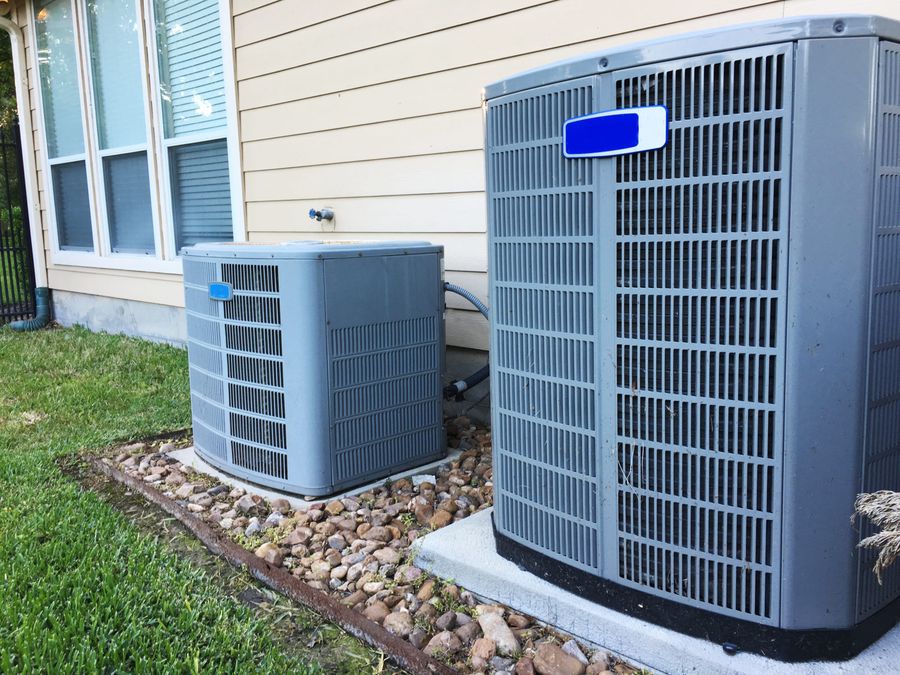
Overview Of Heat Pumps
Heat pumps are a technology that harnesses energy from the environment to heat and cool buildings. They have become increasingly popular in recent years, with more homeowners recognizing their efficiency and cost-effectiveness. Heat pumps are systems which rely on basic principles of physics to transfer heat between two environments without the use of additional energy sources. By using heat pumps, people can save money on their energy bills while also reducing their environmental impact.
Heat pumps are relatively simple systems that make use of several components to achieve efficient cooling and heating. The system includes an outdoor unit which works to absorb heat from the air or ground, depending on the type of pump used, and then transfers it indoors where it is released into a room or space. Heat pumps come in many different sizes and can be installed for both residential and commercial purposes. Their technology is based on principles such as convection, conduction, radiation, absorption, and evaporation. Through these principles, heat pumps are able to effectively move thermal energy from one location to another without any additional input source.
Heat pumps offer a number of benefits over traditional HVAC (Heating Ventilation Air Conditioning) systems including higher efficiency ratings due to their ability to transfer energy rather than generate it; lower operating costs because they require less electricity; improved indoor air quality since there is no combustion involved; and better temperature control throughout the home or building due to even distribution of warm or cold air. Heat pump systems provide a great solution for anyone looking for an efficient way to manage their heating and cooling needs while also saving money in the process.
Advantages And Disadvantages
Heat pumps offer a range of advantages that make them an attractive option for those looking to improve their energy efficiency. One of the most notable benefits is the potential for lower energy bills, thanks to improved system performance and greater energy savings. Additionally, the initial cost of purchasing and installing a heat pump can be offset by long-term energy efficiency benefits. Heat pumps can also reduce environmental impacts through reduced reliance on fossil fuels or electricity generated from nonrenewable sources.
Despite these advantages, there are some drawbacks associated with heat pumps that should be taken into account when making a decision about whether or not to install one in your home. The cost of purchasing and installing a heat pump can be relatively high compared to traditional heating and cooling systems. Additionally, they may require more maintenance than other systems and are not suitable for all climates due to their reliance on outside air temperatures.
It’s important to weigh the pros and cons carefully when deciding whether to invest in a heat pump system. Doing so will help ensure you get the most out of your investment while minimizing any negative impacts on your wallet or the environment.
Types Of Heat Pumps
Heat pumps come in a variety of shapes and sizes. Depending on the climate and heating needs, there’s likely a heat pump that meets your requirements. Here are some of the most common types: geothermal, air-source, ductless, ground-source and absorption.
Geothermal heat pumps use underground pipes to extract heat from the earth and use it to warm buildings. They are very efficient and require little maintenance, making them an attractive option for those looking for a cost-effective way to stay warm in colder months.
Air-source heat pumps transfer warmth from the outside air into buildings or homes. They are also cost-effective but have limited reach in cold climates due to their reliance on outdoor temperatures. Ductless heat pumps offer an alternative solution as they don’t require ductwork installation and can be used in more extreme climates due to their ability to move hot or cold air directly into rooms without having to pass through ducts.
Ground-source heat pumps draw energy from temperatures below the surface of the Earth, which makes them an energy-efficient option even in colder climates. Finally, absorption heat pumps draw energy from solar panels or other sources of renewable energy such as biomass combustion or geothermal energy exchange systems. These types of systems are not only efficient but also environmentally friendly because they rely on renewable resources rather than fossil fuels for their power source.
Heat pumps offer many advantages when it comes to heating efficiency, no matter which type you choose. Heat pump technology is constantly evolving with new advancements making them even more efficient at providing comfortable temperatures year round while helping you save money on your utility bills.
Installation Considerations
When considering the installation of a heat pump, it’s important to consider all of the requirements. Heat pumps need to be installed by professionals who are familiar with the product and have experience with installation. The cost of a professional installation is typically much more than a replacement cost, so having an experienced technician onsite is essential.
Heat pump installation will vary depending on the size and type of system being installed. For example, a larger unit may require additional piping or insulation to be properly installed. Additionally, heat pumps must be connected to an existing power source before they can function correctly. It’s important to carefully research any local building codes that may apply before beginning an installation project.
Overall, it’s important to remember that heat pump installation can be costly and should always be completed by a professional. Make sure you get multiple estimates from different service providers in order to compare costs and find the best deal for your budget. By taking the time to find the right contractor for your needs, you’ll ensure that your heat pump works efficiently for years to come.
Energy Savings Potential
Heat pumps are incredibly efficient, and offer significant savings compared to other heating systems. In terms of energy efficiency ratings, most heat pumps have a rating of between 300% and 600%. This means that for every unit of energy used to power the heat pump, it produces up to three times as much heat output. As a result, running costs are significantly lower than traditional heating systems. On top of this, many models come with an Energy Star rating which offers additional savings.
The environmental impact of using a heat pump is also hugely beneficial. By using renewable energy sources such as solar or wind power, you can reduce your carbon footprint while receiving all the benefits of a more efficient system. Heat pumps are also more efficient at converting energy into usable heat, meaning that less is wasted in the process. All in all, they provide an outstanding level of cost-savings and environmental impact reduction.
Maintenance Requirements
Heat pumps require maintenance to ensure efficient operation. Heat pump repairs, servicing, and inspections should be done at least once a year. If the system is not working properly, it should be checked out by an experienced technician. This can help identify and fix problems before they become serious and costly.
Proper upkeep of your heat pump is essential for its longevity. Regularly inspect the system for signs of wear and tear, such as vibration or strange noises coming from the unit. Check all components for damage or corrosion, especially in outdoor units that are exposed to the elements. It’s also important to check the refrigerant level and electrical connections to ensure everything is running smoothly.
It’s important to stay on top of your heat pump maintenance so you can get the most out of your investment. Taking preventative measures now can save you money in the long run by avoiding costly repairs or replacements down the road. So don’t wait until you have an issue – take action today!
Frequently Asked Questions
What Is The Expected Lifespan Of A Heat Pump?
When it comes to the expected lifespan of a heat pump, there are several factors that come into play. Heat pumps have an average life expectancy of 15-20 years, depending on their level of maintenance and care. With regular maintenance and servicing, heat pumps can remain in good working condition for longer than this. In addition to routine maintenance and servicing, heat pump durability is also impacted by things like:
- The environment in which the heat pump is installed
- The quality of the installation process
- The type of components used in the system
The longevity of a heat pump is largely determined by how well it is cared for over its lifetime. Investing in regular servicing and repairs can extend the life of your heat pump by up to 10 years or more. Taking proactive steps to maintain your system will ensure it’s running efficiently and safely for many years to come.
To help you maximize your heat pump’s life expectancy, here are some tips:
- Follow manufacturer’s instructions carefully when installing any components related to the system
- Schedule regular preventative maintenance checks with a qualified technician
- Make sure all filters are clean and clear at all times
By following these tips and taking proper care of your heat pump, you’ll be able to enjoy its benefits for a long time to come.
What Kind Of Temperatures Can A Heat Pump Handle?
When it comes to heat pumps, one of the key considerations is what kind of temperatures it can handle. Heat pump capacity and temperature range varies depending on the quality of the unit and its size. Maximum temperature that a heat pump can handle is typically determined by the type of refrigerant used and the coil design, while minimum temperature is usually set by the compressor itself.
Knowing what kind of temperatures a heat pump can handle is important for those seeking a reliable solution to their heating and cooling needs. Depending on your climate and desired comfort level, you may want to choose one that has a wide enough range to meet your needs. Heat pumps are an effective way to provide both heating and cooling without having to purchase two separate systems – giving you more freedom in terms of cost savings and convenience.
Heat pumps are an ideal choice for homeowners looking for an efficient, cost-effective way to regulate their indoor climate. With different options when it comes to temperature ranges, there’s sure to be a model available that meets your needs – giving you greater peace of mind about your decision-making process.
How Much Noise Does A Heat Pump Produce?
When it comes to choosing a heating system for your home, heat pump noise is an important factor to consider. Heat pumps can be extremely efficient, but you’ll want to make sure that the sound levels won’t be too disruptive. To ensure that you’re getting the best of both worlds – efficiency and quiet operation – it’s essential to know about noise levels for heat pumps.
The good news is that most modern heat pumps have been designed with noise reduction in mind, so they operate at decibel levels much lower than traditional heating systems. This means that even when the pump is running at its highest setting, the heat pump sound levels are usually fairly muted. In some cases, the sound can be barely audible or even unnoticeable altogether. That said, there are still certain steps you can take to further reduce noise from your heat pump if necessary.
For instance, you may want to install your heat pump away from bedrooms and living areas where people tend to congregate or work. You may also want to invest in a unit with a fan designed specifically for noise reduction. With these measures in place, you can rest assured that your heat pump will keep your home warm without making too much of a racket.
Are There Any Health Concerns Associated With Heat Pumps?
When it comes to the safety of heat pumps, there are some health concerns that you should be aware of. Heat pumps can have an effect on air quality both indoors and outdoors, and could potentially lead to respiratory problems. For this reason, it’s important to consider the potential health risks associated with heat pumps before making a purchase.
Fortunately, there are steps you can take to ensure your safety while using a heat pump. One of the most important is to ensure that your indoor air is regularly monitored and filtered in order to maintain good air quality. Regular maintenance of the heat pump is also essential in order to ensure that it runs efficiently and safely. Additionally, by ensuring that any moisture problems in your home are dealt with promptly, you can reduce the risk of developing respiratory issues caused by mould or bacteria.
By taking these precautions, you can make sure you enjoy a safe and healthy environment without having to worry about any potential health risks associated with using a heat pump. With the right measures in place, you can rest assured knowing that your freedom from worry has been preserved while still benefitting from all the advantages that come with installing a heat pump.
What Type Of Maintenance Is Required For A Heat Pump?
When it comes to heat pumps, maintenance is key. Heat pump upkeep is essential in order to prevent any potential issues down the line and ensure that the system works correctly and efficiently. To keep your heat pump running smoothly, regular servicing and repairs are necessary.
There are a few types of maintenance required for heat pumps. Heat pump installation should always be performed by a qualified technician; however, some basic maintenance can be done by the homeowner, such as changing air filters regularly. Additionally, an annual servicing check-up should be conducted to make sure the system is functioning properly and that all parts are in good condition. In some cases, more frequent servicing may be needed if you live in an especially hot or cold climate. Furthermore, repairs should be carried out as soon as any signs of damage or malfunction become apparent in order to prevent further damage to the unit or system.
Heat pump maintenance is essential for ensuring your system runs efficiently and safely – but fear not! With proper upkeep and care, you can enjoy reliable performance from your heat pump with minimal hassle. After all, who doesn’t love feeling free from worrying about their heating system?
Conclusion
Heat pumps are a very efficient and cost effective way to heat and cool your home. Their expected lifespan is quite long, usually between 10-15 years, so you can expect to get many years of use out of them. They are capable of maintaining comfortable temperatures in any climate, and they produce very little noise compared to other heating and cooling systems. There are no known health concerns associated with heat pumps, and the only maintenance required is a yearly service check from a qualified technician.
Overall, heat pumps offer great value for money since they last for such a long time while using minimal energy. They’re also quite reliable so you needn’t worry about unexpected breakdowns or repairs. The key to keeping your heat pump working efficiently is regular maintenance and servicing, which will help ensure that it continues to work as well as it did when it was first installed.
In conclusion, heat pumps are an excellent choice for anyone looking for an energy efficient system that can keep their home at a comfortable temperature year round. With proper care and maintenance, you can expect your heat pump to last for many years and provide you with dependable comfort throughout those years.

